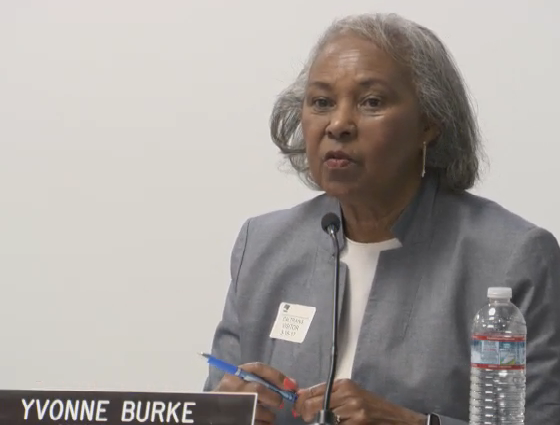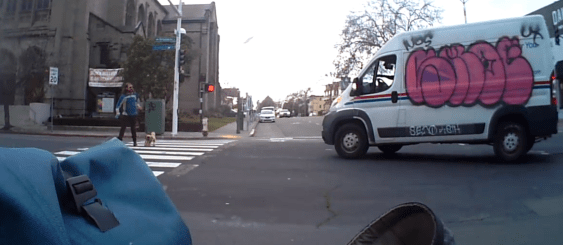On Monday morning, the Assembly Transportation Committee will consider A.B. 179. The bill, from freshman Assemblymember Sabrina Cervantes (D-Corona), would require at least one member of the California Transportation Commission (CTC) to be a representative of communities “most significantly burdened by, and vulnerable to, high levels of pollution, including. . . those communities with racially and ethnically diverse populations or with low-income populations.”
That would bring a bit of balance to the CTC membership, which currently comprises pro-highway, anti-pedestrian, tone-deaf real estate developers and business leaders.
Currently, there is only one rule about who should serve on the CTC, an important commission that makes all major funding decisions for state-funded transportation projects. That rule says there should be a balance on the commission between north and south, urban and rural areas. Beyond that, anyone can apply to be a commissioner, and the staggered two-year terms come up for appointment regularly.
Governor Brown seems mostly content to reappoint existing commissioners, rather than seek other candidates. He recently dashed hopes among some advocates for broader representation when he reappointed two long-time commissioners, Joseph Tavaglione and Yvonne Burke.
Governor Brown must either believe that things are going well on the commission, or that the decisions made by the CTC aren't all that important. When Streetsblog contacted the governor's office to ask about upcoming appointments, his staff declined to answer questions about potential candidates, or about whether any effort had been made to find other qualified candidates.
There are thirteen commissioners on the CTC. Nine of those are appointed by the governor. The Assembly and the Senate each appoint two members, including an ex-officio member who is a current legislator. Those two are Senator Jim Beall (D-Campbell), and Assemblymember Jim Frazier (D-Oakley), both chairs of the transportation committees in their respective houses.
All of the other commissioners are either former government officials, real estate developers, business leaders, or representatives of labor groups.
There is also one empty seat. That appointment has been vacant since Brown declined to reappoint Darius Assemi, a developer in Fresno who had been a commissioner for about two years.
It is troubling that real estate developers, whose natural interests would lead them to seek highway expansion to serve their industry, have such a strong presence on the commission. The same goes for representatives of industries and labor groups that benefit from large highway construction projects.
Many of the decisions made by the CTC perpetuate the outdated notion that expanding highways can solve congestion. And although a few of the commissioners have shown some awareness of the importance, say, of encouraging active transportation modes, too many conversations at commission meetings show that most of them just don't get it.
Case in point: a recent meeting wherein Yvonne Burke—whom CTC staff has pointed to as an example of the “diversity” on the board—tried several times to get a Caltrans staffer to say that distracted pedestrians was a causal factor in an increase in pedestrian crashes.
At first the staffer didn't take the bait. “Distracted driving is a problem for all modes,” he said. Unfortunately he didn't stop while he was ahead. “Being a pedestrian means being a smart roadway user,” he went on. “Just watching the little man turn on doesn't mean it's time to step into the street.”
You can find the exchange here--look for the March 16, 2017 meeting, at about the 63:00 mark--but the point is that Burke is clueless about pedestrian safety.
There are other examples buried in recordings of their two-day-long meetings. On numerous occasions commissioners have opposed funding for planning and programming, two important ways local communities can encourage people to replace car trips with active transportation trips. Several have stated that reducing vehicle miles traveled is unimportant.
As little attention is paid to the concerns of low-income people who don't drive as possible. Advocates hope that A.B. 179 will ensure that at least one commissioner has the knowledge and experience necessary to speak for the people who live with the consequences of highway expansion and sprawl--to balance the people who benefit financially from those projects.
Last year, Richard Bloom (D-Santa Monica) tried to introduce a similar bill, but it was quickly squashed by Assembly Transportation Committee chair Frazier. He huffed at the idea that the “special interests” of low-income communities would be represented on the commission, while other “special interests” – like the freight industry – were not. (But note: Fran Inman, for one, has been a stanch defender of the interests of the freight industry while she's been on the commission, and so has Frazier himself.)
There is some concern that A.B. 179 might meet a similar fate when it is heard on Monday morning. TransForm and a large coalition of partners have sent out a call for support for the bill.






